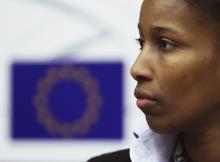malalai joya

Controversial American author Ayaan Hirsi Ali has been a regular fixture on major news networks lately, discussing her most recent book, Heretic, as well as her views on various issues that include violence in Islam and the treatment of Muslim women.
An ex-Muslim, Hirsi Ali began her rise to fame with her book Infidel, which documented her hardships growing up as a Muslim woman in her native Somalia. In light of her turbulent past, Hirsi Ali has gained strong following in the West. Prominent atheist author Richard Dawkins has called her a “hero for rationalism and feminism.” Now, after the release of Heretic, some are again cheering her as a brave champion for women’s rights, especially for Muslim women.
While many in the West have been receptive to her case, Hirsi Ali’s vicious attacks on Islam and her support for the war on terror, fought mainly in Muslim countries , have left her with few friends among Muslims, including women. Hirsi Ali once famously called Islam a “nihilistic cult of death,” and she has advocated for a war with Islam.
Many examples of brave Muslim women exist in the Muslim world, yet it is not surprising that Hirsi Ali, regardless of her dangerous assertions, has stolen the limelight. As the American government continues to indulge in the war on terror, Hirsi Ali’s story makes her the perfect candidate to provide validation for the atrocities committed by the U.S., from Somalia to Pakistan.
The war on terror is largely a bipartisan issue. But media personalities, especially neoconservatives, have rushed to Hirsi Ali’s defense . Seemingly ever ready for war in the post-9/11 era, they look to Hirsi Ali’s views to help legitimize their own anti-Islam bias and imperialist ambitions.
It is no surprise, then, that she is a fellow at the American Enterprise Institute, which has consistently tried to foster antagonistic relations between the U.S. and the Muslim world.
The liberal media, which have provided a more balanced view on Islam, also sympathize with Hirsi Ali’s detrimental views, especially in its simplistic portrayals of women in the Islamic world.